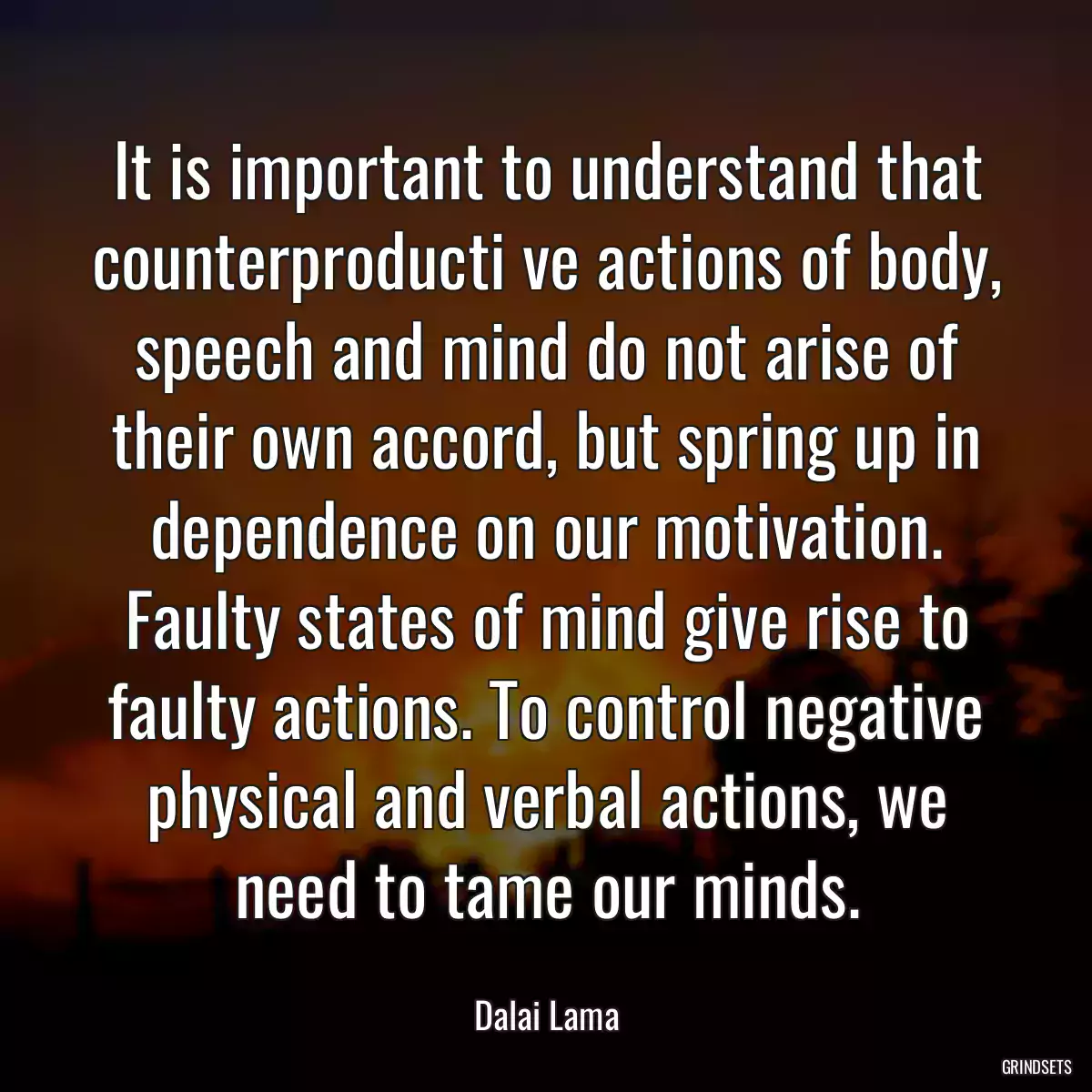
Quotes Dalai Lama - page 4
Find dozens of Dalai Lama with images to copy and share.

When we face problems with compassion, sincerity, and good motivation, our solutions may take longer, but ultimately they are better.
By setting our motivation strongly in the morning when our mind is fresh and clear, we are much more likely to remember it during the day and act with that intention
There is a true feminist movement in Buddhism that relates to the goddess Tārā. Following her cultivation of bodhicitta, the bodhisattva's motivation, she looked upon the situation of those striving towards full awakening and she felt that there were too few people who attained Buddhahood as women. So she vowed, 'I have developed bodhicitta as a woman. For all my lifetimes along the path I vow to be born as a woman, and in my final lifetime when I attain Buddhahood, then, too, I will be a woman.'
You may also like
We have to have some form of politics. Politics is a form of resolving conflicts. Politics which comes from sincere motivation is constructive.
The nature of our motivation determines the character of our work.
The real troublemakers are anger, jealousy, impatience, and hatred. With them, problems cannot be solved. Though we may have temporary success, ultimately our hatred or anger will create futher difficulties. Anger makes for swift solutions. Yet, when we face problems with compassion, sincerity, and good motivation, our solutions may take longer, but ultimately they are better.
Your motivation should be sincere and your life should be of benefit to some people. That is the main thing. Don't care after my death.
Developing inner values is much like physical exercise. The more we train our abilities, the stronger they become. The difference is that, unlike the body, when it comes to training the mind, there is no limit to how far we can go.

A good motivation is what is needed: compassion without dogmatism, without complicated philosophy; just understanding that others are human brothers and sisters and respecting their human rights and dignities. That we humans can help each other is one of our unique human capacities.
The motivation of all religious practice is similar: love, sincerity, honesty. The way of life of practically all religious persons is consistent. The teachings of tolerance, love, and compassion are the same.
unless the direction of science is guided by a consciously ethical motivation, especially compassion, its effects may fail to bring benefit. They may indeed cause great harm.
Whether you believe in God or not does not matter so much, whether you believe in Buddha or not does not matter so much; as a Buddhist, whether you believe in reincarnation or not does not matter so much. You must lead a good life. And a good life does not mean just good food, good clothes, good shelter. These are not sufficient. A good motivation is what is needed: compassion, without dogmatism, without complicated philosophy; just understanding that others are human brothers and sisters and respecting their rights and human dignity.
Education is the proper way to promote compassion and tolerance in society. Compassion and peace of mind bring a sense of confidence that reduce stress and anxiety, whereas anger and hatred come from frustration and undermine our sense of trust. Because of ignorance, many of our problems are our own creation. Education, however, is the instrument that increases our ability to employ our own intelligence.
I think technology really increased human ability, but technology cannot produce compassion.
I feel that the essence of spiritual practice is your attitude toward others. When you have a pure, sincere motivation, then you have right attitude toward others based on kindness, compassion, love and respect.
Those who suffer from an exaggerated sense of their own ability and accomplishment are continually subject to frustration, disappointment, and rage when reality intrudes and the world doesn't validate their idealized view of themselves.
You may also like

To help us bring benefit to others through our words and actions, it is useful to cultivate an attitude of sympathetic joy in others’ achievements and good fortune. This attitude is a powerful antidote against envy, which is not only a source of unnecessary suffering on the individual level but also an obstacle to our ability to reach out and engage with others.